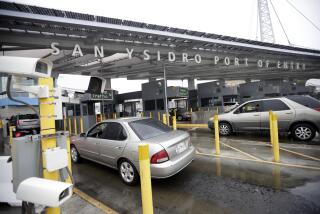Ex-CIA Aide Portrayed at Trial as Victim, Liar : Law: Prosecution says Clair George hid truth from Iran-Contra inquiries. Defense blames key witness.
- Share via
WASHINGTON — Clair E. George, the former CIA covert actions chief accused of lying and obstruction to thwart Iran-Contra investigations, is instead the victim of “a witness who is an admitted liar” and biased inquiries by hypocritical members of Congress, his lawyer said in an opening statement at his trial Friday.
But prosecutor Craig A. Gillen, declaring that “this case is about truth,” described George as a liar who sought to help assure passage of a $100-million congressional appropriation to resume aid to the Nicaraguan rebels in 1986.
The conflicting portraits of the former third-ranking CIA official drew no visible response from the seven-woman, five-man jury, some of whom took notes on yellow legal pads as Gillen outlined the government’s complex case.
In his opening statement, George’s lawyer, Richard A. Hibey, made clear that the defense will hinge on attacking the credibility of Alan D. Fiers Jr., former chief of the CIA’s Central American task force and the prosecution’s main witness.
Fiers pleaded guilty last summer to two misdemeanor counts of withholding information from Congress and then drew praise from prosecutors for his cooperation in their investigation. He is scheduled to take the witness stand Monday.
Gillen disclosed Friday that an FBI fingerprint analysis will be used to buttress Fiers’ claim that George instructed him to delete key information from a draft of a statement to be given to Congress.
The altered document was found in George’s safe and carried his fingerprints, the prosecutor said.
George is charged with nine felony counts of perjury, false statements and obstruction in his testimony before House and Senate committees and a federal grand jury concerning secret plans to sell arms to the Iranians and divert the profits to fund the Contras.
Hibey said that George, as “a career officer of the CIA” and never a political appointee, “had no motive” to lie. “He had no intent.”
“At all times, he spoke what he believed to be the truth,” Hibey said. “If there were mistakes in what he said, they were honest mistakes.”
Several of the charges involve George’s congressional testimony and alleged instructions to Fiers about the Oct. 5, 1986, downing by Nicaraguan government forces of a Contra resupply plane that was a secret project of then White House aide Oliver L. North.
Fiers, according to the indictment, told George that they must admit at a Senate Foreign Relations Committee briefing that the “Max Gomez” involved in the resupply operation was actually Felix Rodriguez. Rodriguez, a retired CIA operative, had connections to the office of then Vice President George Bush, according to testimony.
Instead, George directed Fiers to state that the CIA was still trying to determine Gomez’s actual identity.
This led to a joke at CIA headquarters in which employees wore two or three kinds of buttons bearing such slogans as “I Am Max Gomez” and “I Love Max,” the unsmiling Gillen told the jury. “Mr. George was in on the joke. So was Fiers.”
Sen. John Kerry (D-Mass.), a staunch foe of Contra aid, testified as the leadoff prosecution witness. He said truthful answers from George at a Senate Foreign Relations Committee hearing five days after the plane was shot down could have shattered the secrecy surrounding the case.
“If we had known at that moment indeed that Max Gomez was Felix Rodriguez and of the connection to the vice president’s office, it would have opened a window that took considerably longer to open,” Kerry said.
But keeping such matters secret was crucial because “the $100-million (Contra aid appropriation) was at issue, and this had the capacity to upset it,” Kerry said.
In a series of sharp exchanges, Kerry, a former prosecutor, refused to go along with Hibey’s suggestion that the senator was biased in his inquiries related to Contra aid.
“I’m asking if you had bias,” Hibey said, as he asked the question for the fourth time during cross-examination.
“At the time I undertook (the investigation), I was an opponent” of Contra aid, Kerry said. “That was not what was driving my investigation.”
“I’m not asking what drove your investigation,” Hibey said. “I’m asking did you have a bias against the policy.”
Kerry said what while he opposed the policy, this did not “condition” his inquiry.
More to Read
Get the L.A. Times Politics newsletter
Deeply reported insights into legislation, politics and policy from Sacramento, Washington and beyond. In your inbox twice per week.
You may occasionally receive promotional content from the Los Angeles Times.









